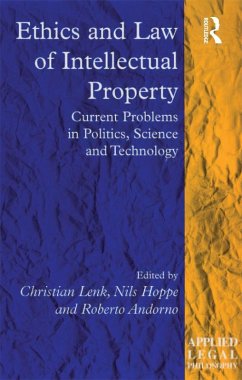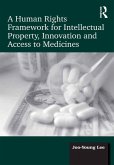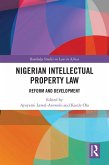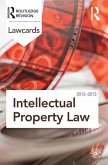Christian Lenk, Nils Hoppe
Ethics and Law of Intellectual Property (eBook, PDF)
Current Problems in Politics, Science and Technology
41,95 €
41,95 €
inkl. MwSt.
Sofort per Download lieferbar

21 °P sammeln
41,95 €
Als Download kaufen

41,95 €
inkl. MwSt.
Sofort per Download lieferbar

21 °P sammeln
Jetzt verschenken
Alle Infos zum eBook verschenken
41,95 €
inkl. MwSt.
Sofort per Download lieferbar
Alle Infos zum eBook verschenken

21 °P sammeln
Christian Lenk, Nils Hoppe
Ethics and Law of Intellectual Property (eBook, PDF)
Current Problems in Politics, Science and Technology
- Format: PDF
- Merkliste
- Auf die Merkliste
- Bewerten Bewerten
- Teilen
- Produkt teilen
- Produkterinnerung
- Produkterinnerung

Bitte loggen Sie sich zunächst in Ihr Kundenkonto ein oder registrieren Sie sich bei
bücher.de, um das eBook-Abo tolino select nutzen zu können.
Hier können Sie sich einloggen
Hier können Sie sich einloggen
Sie sind bereits eingeloggt. Klicken Sie auf 2. tolino select Abo, um fortzufahren.

Bitte loggen Sie sich zunächst in Ihr Kundenkonto ein oder registrieren Sie sich bei bücher.de, um das eBook-Abo tolino select nutzen zu können.
Divided into three parts, this edited volume gives an overview of current topics in law and ethics in relation to intellectual property. It addresses practical issues encountered in everyday situations in politics, research and innovation, as well as some of the underlying theoretical concepts.
- Geräte: PC
- mit Kopierschutz
- eBook Hilfe
- Größe: 1.72MB
Andere Kunden interessierten sich auch für
![A Human Rights Framework for Intellectual Property, Innovation and Access to Medicines (eBook, PDF) A Human Rights Framework for Intellectual Property, Innovation and Access to Medicines (eBook, PDF)]() Joo-Young LeeA Human Rights Framework for Intellectual Property, Innovation and Access to Medicines (eBook, PDF)49,95 €
Joo-Young LeeA Human Rights Framework for Intellectual Property, Innovation and Access to Medicines (eBook, PDF)49,95 €![Nigerian Intellectual Property Law (eBook, PDF) Nigerian Intellectual Property Law (eBook, PDF)]() Nigerian Intellectual Property Law (eBook, PDF)43,95 €
Nigerian Intellectual Property Law (eBook, PDF)43,95 €![World Intellectual Property Organization (WIPO) (eBook, PDF) World Intellectual Property Organization (WIPO) (eBook, PDF)]() Christopher MayWorld Intellectual Property Organization (WIPO) (eBook, PDF)38,95 €
Christopher MayWorld Intellectual Property Organization (WIPO) (eBook, PDF)38,95 €![Wanted, More than Human Intellectual Property (eBook, PDF) Wanted, More than Human Intellectual Property (eBook, PDF)]() Johanna GibsonWanted, More than Human Intellectual Property (eBook, PDF)41,95 €
Johanna GibsonWanted, More than Human Intellectual Property (eBook, PDF)41,95 €![The Intellectual Property and Food Project (eBook, PDF) The Intellectual Property and Food Project (eBook, PDF)]() Charles LawsonThe Intellectual Property and Food Project (eBook, PDF)41,95 €
Charles LawsonThe Intellectual Property and Food Project (eBook, PDF)41,95 €![Food Security, Biological Diversity and Intellectual Property Rights (eBook, PDF) Food Security, Biological Diversity and Intellectual Property Rights (eBook, PDF)]() Muriel LightbourneFood Security, Biological Diversity and Intellectual Property Rights (eBook, PDF)51,95 €
Muriel LightbourneFood Security, Biological Diversity and Intellectual Property Rights (eBook, PDF)51,95 €![Intellectual Property Lawcards 2012-2013 (eBook, PDF) Intellectual Property Lawcards 2012-2013 (eBook, PDF)]() RoutledgeIntellectual Property Lawcards 2012-2013 (eBook, PDF)38,95 €
RoutledgeIntellectual Property Lawcards 2012-2013 (eBook, PDF)38,95 €-
-
-
Divided into three parts, this edited volume gives an overview of current topics in law and ethics in relation to intellectual property. It addresses practical issues encountered in everyday situations in politics, research and innovation, as well as some of the underlying theoretical concepts.
Dieser Download kann aus rechtlichen Gründen nur mit Rechnungsadresse in A, B, BG, CY, CZ, D, DK, EW, E, FIN, F, GR, HR, H, IRL, I, LT, L, LR, M, NL, PL, P, R, S, SLO, SK ausgeliefert werden.
Produktdetails
- Produktdetails
- Verlag: Taylor & Francis eBooks
- Seitenzahl: 306
- Erscheinungstermin: 13. Mai 2016
- Englisch
- ISBN-13: 9781317141372
- Artikelnr.: 45095804
- Verlag: Taylor & Francis eBooks
- Seitenzahl: 306
- Erscheinungstermin: 13. Mai 2016
- Englisch
- ISBN-13: 9781317141372
- Artikelnr.: 45095804
- Herstellerkennzeichnung Die Herstellerinformationen sind derzeit nicht verfügbar.
Christian Lenk is a Researcher, and Assistant Professor at the Department for Ethics and History of Medicine at the University of Goettingen, Germany. He also is a member of the research ethics committee of the University of Goettingen and in charge of the Goettingen project of PROPEUR. Nils Hoppe worked in child abuse law in England until 2001, as legal counsel in a large university hospital until 2003 and is now a Senior Lecturer in English for law at the University of Hannover, Germany, where he is also working on his doctorate in law on a topic related to property rights in biological material. Roberto Andorno was a member of the UNESCO International Bioethics Committee from 1998 to 2005. He is currently Senior Research Fellow at the Ethics Centre of the University of Zurich, Switzerland.
Introduction; Part 1 Political Regulations and Institutions; Chapter 1
Biobank Governance: Property, Privacy and Consent, Roger Brownsword;
Chapter 2 Population Genetic Databases: A New Challenge to Human Rights,
Roberto Andorno; Chapter 3 Intellectual Property Rights and the Right to
Health: Considering the Case of Access to Medicines, Alyna C. Smith;
Chapter 4 International Protection of Human Genetic Data - The UNESCO
Declaration on Human Genetic Data and the Possible Impact on Genetic
Governance Models, Tobias Schulte in den Bäumen; Chapter 5 TRIPS
Jurisprudence in the Balance: Between the Realist Defense of Policy Space
and a Shared Utilitarian Ethic, Antony S. Taubman; Part 2 Science and
Intellectual Property; Chapter 6 Exclusive Property Rights in the
Biosciences: An Ethical Discussion, Christian Lenk; Chapter 7 Enclosing the
"Knowledge Commons": Patenting Genes for Disease Risk and Drug Response at
the University-Industry Interface, Bryn Williams-Jones, Vural Ozdemir;
Chapter 8 Reconceptualizing Genetics: Challenges to Traditional Medical
Ethics, Heather Widdows; Chapter 9 Lack of Access to Essential Drugs: A
Story of Continuing Global Failure, with Particular Attention to the Role
of Patents, Sigrid Sterckx; Chapter 10 Out of Touch: From Corporeal to
Incorporeal, or Moore Revisited, Nils Hoppe; Part 3 Distribution, Licensing
and Protection of Intellectual Property; Chapter 11 Knowledge and
Information - Private Property or Common Good? A Global Perspective, Rainer
Kuhlen; Chapter 12 The Limit of Balancing Interests Through Copyright
Levies, Lucie Guibault; Chapter 13 The Institutional Nature of the Patent
System: Implications for Bioethical Decision-Making, Sivaramjani
Thambisetty; Chapter 14 Why People Give Information Freely: Internet
Architecture and the Rebirth of Folkloric Culture, John Cahir;
Biobank Governance: Property, Privacy and Consent, Roger Brownsword;
Chapter 2 Population Genetic Databases: A New Challenge to Human Rights,
Roberto Andorno; Chapter 3 Intellectual Property Rights and the Right to
Health: Considering the Case of Access to Medicines, Alyna C. Smith;
Chapter 4 International Protection of Human Genetic Data - The UNESCO
Declaration on Human Genetic Data and the Possible Impact on Genetic
Governance Models, Tobias Schulte in den Bäumen; Chapter 5 TRIPS
Jurisprudence in the Balance: Between the Realist Defense of Policy Space
and a Shared Utilitarian Ethic, Antony S. Taubman; Part 2 Science and
Intellectual Property; Chapter 6 Exclusive Property Rights in the
Biosciences: An Ethical Discussion, Christian Lenk; Chapter 7 Enclosing the
"Knowledge Commons": Patenting Genes for Disease Risk and Drug Response at
the University-Industry Interface, Bryn Williams-Jones, Vural Ozdemir;
Chapter 8 Reconceptualizing Genetics: Challenges to Traditional Medical
Ethics, Heather Widdows; Chapter 9 Lack of Access to Essential Drugs: A
Story of Continuing Global Failure, with Particular Attention to the Role
of Patents, Sigrid Sterckx; Chapter 10 Out of Touch: From Corporeal to
Incorporeal, or Moore Revisited, Nils Hoppe; Part 3 Distribution, Licensing
and Protection of Intellectual Property; Chapter 11 Knowledge and
Information - Private Property or Common Good? A Global Perspective, Rainer
Kuhlen; Chapter 12 The Limit of Balancing Interests Through Copyright
Levies, Lucie Guibault; Chapter 13 The Institutional Nature of the Patent
System: Implications for Bioethical Decision-Making, Sivaramjani
Thambisetty; Chapter 14 Why People Give Information Freely: Internet
Architecture and the Rebirth of Folkloric Culture, John Cahir;
Introduction; Part 1 Political Regulations and Institutions; Chapter 1
Biobank Governance: Property, Privacy and Consent, Roger Brownsword;
Chapter 2 Population Genetic Databases: A New Challenge to Human Rights,
Roberto Andorno; Chapter 3 Intellectual Property Rights and the Right to
Health: Considering the Case of Access to Medicines, Alyna C. Smith;
Chapter 4 International Protection of Human Genetic Data - The UNESCO
Declaration on Human Genetic Data and the Possible Impact on Genetic
Governance Models, Tobias Schulte in den Bäumen; Chapter 5 TRIPS
Jurisprudence in the Balance: Between the Realist Defense of Policy Space
and a Shared Utilitarian Ethic, Antony S. Taubman; Part 2 Science and
Intellectual Property; Chapter 6 Exclusive Property Rights in the
Biosciences: An Ethical Discussion, Christian Lenk; Chapter 7 Enclosing the
"Knowledge Commons": Patenting Genes for Disease Risk and Drug Response at
the University-Industry Interface, Bryn Williams-Jones, Vural Ozdemir;
Chapter 8 Reconceptualizing Genetics: Challenges to Traditional Medical
Ethics, Heather Widdows; Chapter 9 Lack of Access to Essential Drugs: A
Story of Continuing Global Failure, with Particular Attention to the Role
of Patents, Sigrid Sterckx; Chapter 10 Out of Touch: From Corporeal to
Incorporeal, or Moore Revisited, Nils Hoppe; Part 3 Distribution, Licensing
and Protection of Intellectual Property; Chapter 11 Knowledge and
Information - Private Property or Common Good? A Global Perspective, Rainer
Kuhlen; Chapter 12 The Limit of Balancing Interests Through Copyright
Levies, Lucie Guibault; Chapter 13 The Institutional Nature of the Patent
System: Implications for Bioethical Decision-Making, Sivaramjani
Thambisetty; Chapter 14 Why People Give Information Freely: Internet
Architecture and the Rebirth of Folkloric Culture, John Cahir;
Biobank Governance: Property, Privacy and Consent, Roger Brownsword;
Chapter 2 Population Genetic Databases: A New Challenge to Human Rights,
Roberto Andorno; Chapter 3 Intellectual Property Rights and the Right to
Health: Considering the Case of Access to Medicines, Alyna C. Smith;
Chapter 4 International Protection of Human Genetic Data - The UNESCO
Declaration on Human Genetic Data and the Possible Impact on Genetic
Governance Models, Tobias Schulte in den Bäumen; Chapter 5 TRIPS
Jurisprudence in the Balance: Between the Realist Defense of Policy Space
and a Shared Utilitarian Ethic, Antony S. Taubman; Part 2 Science and
Intellectual Property; Chapter 6 Exclusive Property Rights in the
Biosciences: An Ethical Discussion, Christian Lenk; Chapter 7 Enclosing the
"Knowledge Commons": Patenting Genes for Disease Risk and Drug Response at
the University-Industry Interface, Bryn Williams-Jones, Vural Ozdemir;
Chapter 8 Reconceptualizing Genetics: Challenges to Traditional Medical
Ethics, Heather Widdows; Chapter 9 Lack of Access to Essential Drugs: A
Story of Continuing Global Failure, with Particular Attention to the Role
of Patents, Sigrid Sterckx; Chapter 10 Out of Touch: From Corporeal to
Incorporeal, or Moore Revisited, Nils Hoppe; Part 3 Distribution, Licensing
and Protection of Intellectual Property; Chapter 11 Knowledge and
Information - Private Property or Common Good? A Global Perspective, Rainer
Kuhlen; Chapter 12 The Limit of Balancing Interests Through Copyright
Levies, Lucie Guibault; Chapter 13 The Institutional Nature of the Patent
System: Implications for Bioethical Decision-Making, Sivaramjani
Thambisetty; Chapter 14 Why People Give Information Freely: Internet
Architecture and the Rebirth of Folkloric Culture, John Cahir;







